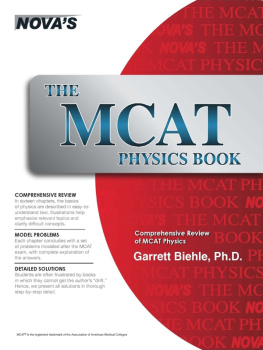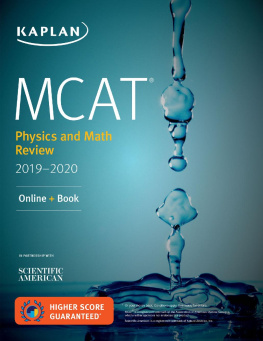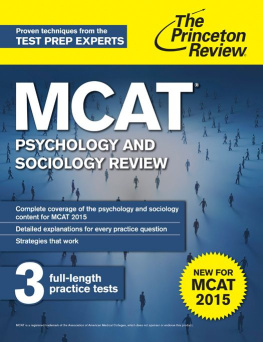Also in McGraw-Hills 500 Questions Series
McGraw-Hills 500 American Government Questions: Ace Your College Exams
McGraw-Hills 500 College Algebra and Trigonometry Questions: Ace Your College Exams
McGraw-Hills 500 College Biology Questions: Ace Your College Exams
McGraw-Hills 500 College Calculus Questions: Ace Your College Exams
McGraw-Hills 500 College Chemistry Questions: Ace Your College Exams
McGraw-Hills 500 College Physics Questions: Ace Your College Exams
McGraw-Hills 500 Differential Equations Questions: Ace Your College Exams
McGraw-Hills 500 European History Questions: Ace Your College Exams
McGraw-Hills 500 French Questions: Ace Your College Exams
McGraw-Hills 500 Linear Algebra Questions: Ace Your College Exams
McGraw-Hills 500 Macroeconomics Questions: Ace Your College Exams
McGraw-Hills 500 Microeconomics Questions: Ace Your College Exams
McGraw-Hills 500 Organic Chemistry Questions: Ace Your College Exams
McGraw-Hills 500 Philosophy Questions: Ace Your College Exams
McGraw-Hills 500 Physical Chemistry Questions: Ace Your College Exams
McGraw-Hills 500 Precalculus Questions: Ace Your College Exams
McGraw-Hills 500 Psychology Questions: Ace Your College Exams
McGraw-Hills 500 Series 7 Exam Questions to Know by Test Day
McGraw-Hills 500 Spanish Questions: Ace Your College Exams
McGraw-Hills 500 U.S. History Questions, Volume 1: Ace Your College Exams
McGraw-Hills 500 U.S. History Questions, Volume 2: Ace Your College Exams
McGraw-Hills 500 World History Questions, Volume 1: Ace Your College Exams
McGraw-Hills 500 World History Questions, Volume 2: Ace Your College Exams
McGraw-Hills 500 MCAT Biology Questions to Know by Test Day
McGraw-Hills 500 MCAT General Chemistry Questions to Know by Test Day
McGraw-Hills 500 MCAT Organic Chemistry Questions to Know by Test Day
Copyright 2016 by McGraw-Hill Education. All rights reserved. Except as permitted under the United States Copyright Act of 1976, no part of this publication may be reproduced or distributed in any form or by any means, or stored in a database or retrieval system, without the prior written permission of the publisher.
ISBN: 978-0-07-183623-4
MHID: 0-07-183623-3
The material in this eBook also appears in the print version of this title: ISBN: 978-0-07-183624-1, MHID: 0-07-183624-1.
eBook conversion by codeMantra
Version 1.0
All trademarks are trademarks of their respective owners. Rather than put a trademark symbol after every occurrence of a trademarked name, we use names in an editorial fashion only, and to the benefit of the trademark owner, with no intention of infringement of the trademark. Where such designations appear in this book, they have been printed with initial caps.
McGraw-Hill Education eBooks are available at special quantity discounts to use as premiums and sales promotions or for use in corporate training programs. To contact a representative, please visit the Contact Us page at www.mhprofessional.com.
MCAT is a registered trademark of the Association of American Medical Colleges, which was not involved in the production of, and does not endorse, this product.
TERMS OF USE
This is a copyrighted work and McGraw-Hill Education and its licensors reserve all rights in and to the work. Use of this work is subject to these terms. Except as permitted under the Copyright Act of 1976 and the right to store and retrieve one copy of the work, you may not decompile, disassemble, reverse engineer, reproduce, modify, create derivative works based upon, transmit, distribute, disseminate, sell, publish or sublicense the work or any part of it without McGraw-Hill Educations prior consent. You may use the work for your own noncommercial and personal use; any other use of the work is strictly prohibited. Your right to use the work may be terminated if you fail to comply with these terms.
THE WORK IS PROVIDED AS IS. McGRAW-HILL EDUCATION AND ITS LICENSORS MAKE NO GUARANTEES OR WARRANTIES AS TO THE ACCURACY, ADEQUACY OR COMPLETENESS OF OR RESULTS TO BE OBTAINED FROM USING THE WORK, INCLUDING ANY INFORMATION THAT CAN BE ACCESSED THROUGH THE WORK VIA HYPERLINK OR OTHERWISE, AND EXPRESSLY DISCLAIM ANY WARRANTY, EXPRESS OR IMPLIED, INCLUDING BUT NOT LIMITED TO IMPLIED WARRANTIES OF MERCHANTABILITY OR FITNESS FOR A PARTICULAR PURPOSE. McGraw-Hill Education and its licensors do not warrant or guarantee that the functions contained in the work will meet your requirements or that its operation will be uninterrupted or error free. Neither McGraw-Hill Education nor its licensors shall be liable to you or anyone else for any inaccuracy, error or omission, regardless of cause, in the work or for any damages resulting therefrom. McGraw-Hill Education has no responsibility for the content of any information accessed through the work. Under no circumstances shall McGraw-Hill Education and/or its licensors be liable for any indirect, incidental, special, punitive, consequential or similar damages that result from the use of or inability to use the work, even if any of them has been advised of the possibility of such damages. This limitation of liability shall apply to any claim or cause whatsoever whether such claim or cause arises in contract, tort or otherwise.
CONTENTS
Questions 138
Questions 39177
Questions 178226
Questions 227265
Questions 266275
Questions 276308
Questions 309344
Questions 345380
Questions 381400
Questions 401419
Questions 420447
Questions 448467
Questions 468481
Questions 482500
INTRODUCTION
The new MCAT Examination reflects an assessment of students knowledge of concepts and scientific skills, along with the ability to apply those skills and concepts to the analysis of problems and questions related to biological systems. The 375-minute exam evaluates this knowledge in four major areas: (1) Biological and Biochemical Foundations of Living Systems (95 minutes), (2) Chemical and Physical Foundations of Biological Systems (95 minutes), (3) Psychological, Social, and Biological Foundations of Behavior (95 minutes), and (4) Critical Analysis and Reasoning Skills (90 minutes). Ten Foundational Concepts outline the topics included within these major areas. This book addresses Foundational Concept 4 under Chemical and Physical Foundations of Biological Systems, including those areas of physics that underlie an understanding of questions related to these areas:
Foundational Concept 4: Complex living organisms transport materials, sense their environment, process signals, and respond to changes using processes understood in terms of physical principles.
The content categories for this foundational concept that are included in this book are:
4A. Translational motion, forces, work, energy, and equilibrium in living systems
4B. Importance of fluids for the circulation of blood, gas movement, and gas exchange
4C. Electrical circuits and their elements
4D. How light and sound interact with matter
4E. Atoms, nuclear decay, and electronic structure
In testing students scientific inquiry and reasoning skills, MCAT questions will ask them to combine their knowledge with these inquiry and reasoning skills: (1) Knowledge of Scientific Concepts and Principles, (2) Scientific Reasoning and Problem Solving, (3) Reasoning About the Design and Execution of Research, and (4) Data-Based and Statistical Reasoning. Questions in this book emphasize these skills from all areas of inquiry and reasoning: identifying scientific principles and the relationships between them, using various representations (verbal, symbolic, and graphical), identifying observations and applications related to physics concepts, using mathematical equations to solve problems, reasoning about physics concepts, evaluating explanations and predictions, drawing conclusions from observations and evidence, identifying independent and dependent variables, analyzing graphical information to draw conclusions, and using data to make predictions or explain relationships between variables.
Next page




